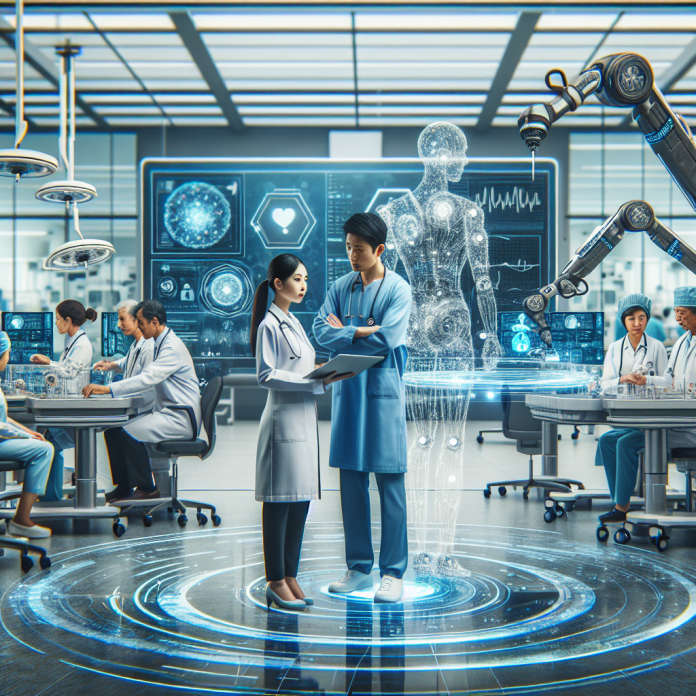Artificial Intelligence (AI) in Public Health Advancements
In recent years, the intersection of artificial intelligence (AI) and public health has demonstrated immense potential for revolutionizing the way we approach healthcare and disease prevention. AI applications have been increasingly utilized to improve public health outcomes by analyzing vast amounts of data, identifying patterns and trends, predicting outbreaks, and accelerating research and drug discovery.
**The Role of AI in Epidemiology**
One of the key areas where AI has made a significant impact is in epidemiology, the study of how diseases spread and how they can be controlled. With the help of AI algorithms, epidemiologists are now able to analyze large datasets in real-time to track disease outbreaks and monitor the spread of infectious diseases.
For example, during the COVID-19 pandemic, AI tools were instrumental in predicting the transmission of the virus, identifying high-risk populations, and optimizing resource allocation. Researchers at the University of Toronto developed an AI model that accurately predicted COVID-19 outbreaks up to seven days in advance, allowing public health officials to take proactive measures to contain the spread of the virus.
**AI-Powered Predictive Modeling**
AI-driven predictive modeling is another area where AI has shown great promise in public health. By analyzing historical data and identifying key risk factors, AI algorithms can predict the likelihood of future disease outbreaks and help public health officials allocate resources more effectively.
For instance, researchers at Harvard University used AI to develop a predictive model for the spread of Ebola in West Africa. By analyzing data on population density, healthcare infrastructure, and travel patterns, the AI model was able to accurately predict the regions most at risk of an outbreak, allowing for targeted interventions and containment strategies.
**Improving Diagnosis and Treatment**
AI technologies are also transforming the way diseases are diagnosed and treated. Machine learning algorithms can analyze medical imaging scans, such as X-rays and MRIs, to detect abnormalities and diagnose diseases with greater accuracy than human doctors.
In a study published in Nature Medicine, researchers at Google Health developed an AI model that outperformed radiologists in detecting breast cancer from mammograms. The AI model achieved a false-positive rate reduction of 5.7% and a false-negative rate reduction of 9.4%, demonstrating the potential of AI to improve diagnostic accuracy and reduce misdiagnosis.
**Drug Discovery and Development**
AI is also playing a crucial role in drug discovery and development, a process that traditionally takes years and billions of dollars to bring a new drug to market. By harnessing the power of AI algorithms, researchers can analyze vast amounts of data on drug interactions, molecular structures, and disease pathways to accelerate the drug discovery process.
For example, Insilico Medicine, a biotech company, used AI to identify a potential drug candidate for fibrosis in just 21 days, a process that typically takes years using traditional methods. By predicting the efficacy and safety of drug candidates through AI simulations, researchers can bring new treatments to patients faster and at a lower cost.
**Challenges and Limitations**
Despite the immense potential of AI in public health advancements, there are still several challenges and limitations that need to be addressed. One of the main concerns is the ethical and privacy implications of using AI in healthcare, especially when it comes to the collection and sharing of sensitive patient data.
Moreover, the lack of regulatory oversight and standardization in AI algorithms poses a risk of bias and error in decision-making, which can have serious consequences for patient outcomes. It is crucial for public health officials and policymakers to establish guidelines and best practices for the responsible use of AI in healthcare to ensure patient safety and data privacy.
**Looking Ahead**
As AI continues to evolve and advance, the possibilities for its application in public health are limitless. From predicting disease outbreaks to improving diagnosis and treatment, AI has the potential to transform the way we approach healthcare and disease prevention.
By harnessing the power of AI algorithms, researchers and public health officials can gain valuable insights into complex health challenges, accelerate research and drug discovery, and ultimately improve public health outcomes for individuals and communities around the world. It is essential for stakeholders in the healthcare industry to embrace AI as a tool for innovation and progress, while also addressing the ethical and regulatory considerations to ensure the responsible and ethical use of AI in public health advancements.
In conclusion, AI in public health advancements offers a glimpse into the future of healthcare, where data-driven insights and predictive modeling can revolutionize the way we approach disease prevention and treatment. By leveraging the capabilities of AI technologies, we have the opportunity to make significant strides in improving public health outcomes and addressing global health challenges in a more efficient and effective manner.

